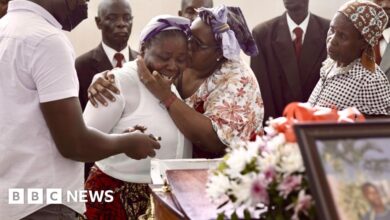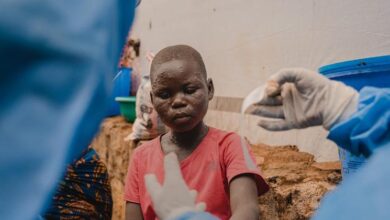The horrors that prostitutes in Sierra Leone go through
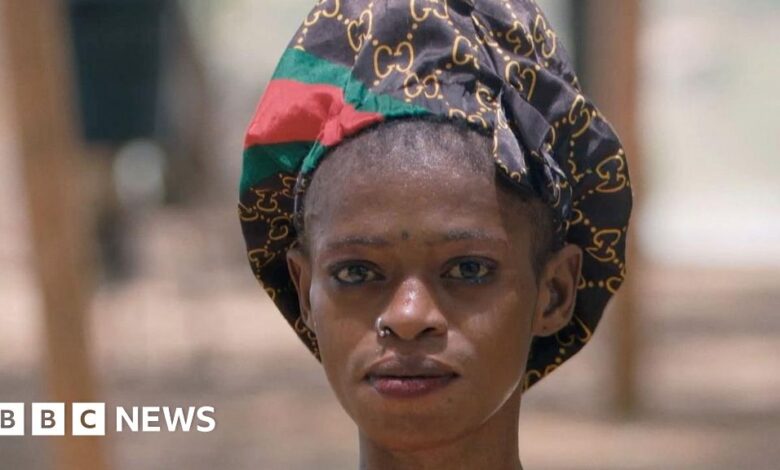
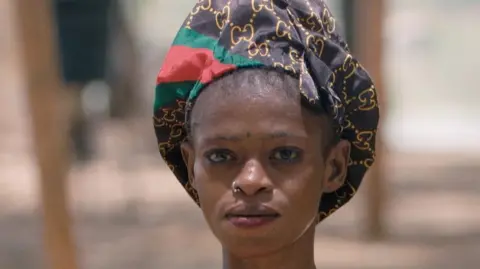 BBC Radio
BBC RadioIsata, a single mother in her twenties, embodies the horrors of life for sex workers in Sierra Leone.
She was beaten, robbed, kidnapped, sold to another country, rescued, sold, and rescued again.
Meanwhile, she had become addicted to a dangerous street drug, kush, that was causing havoc in the West African nation.
BBC Africa Eye spent four years following the lives of a group of sex workers in Makeni, about 200km (124 miles) from the capital Freetown.
The city lies in the diamond-rich region that sparked Sierra Leone’s civil war – a conflict that had devastating consequences and still has repercussions today.
Isata is one of hundreds of sex workers in Makeni. Like all the women we spoke to, she chose to use only her first name.
“All the sacrifices I am making, I am making for my daughter. I have been through so much suffering on the streets,” she said.
“I met a man in a club. He tore my clothes off. He took money from my bra. I was trying to fight to get out. He hit me in the back of the head with a gun. He wanted to kill me.”
It’s a dangerous life – some of the women we met were also HIV positive.
Others were killed.
But many people feel they don’t have much choice.
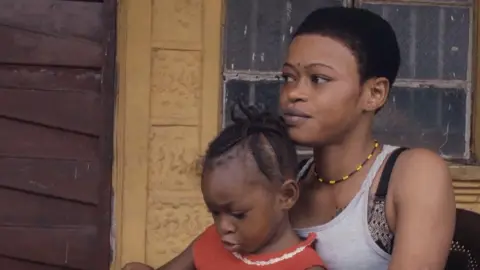
In a dark swampy area of the city, two prostitutes point out an area where empty grain sacks are scattered on the ground.
One of the young girls, Mabinty, told us that this is where they work together – seeing up to 10 men a night.
The men paid them a dollar a time.
She is trying to earn enough money to support her children. She had six children, but three of them died.
The other three are in school.
“A child just finished his exams. I don’t have money to send him to school unless I sell sex. This is my suffering,” she said.
It is estimated that thousands of women are involved in prostitution across Sierra Leone.
Many of them are young women orphaned by the war, which claimed more than 50,000 lives and displaced nearly half the country’s population by the time it ended in 2002.
Charity groups say the number of girls entering prostitution has increased as the country grapples with the economic fallout from the Ebola outbreak and the coronavirus pandemic.
Like many other crises, these ones disproportionately impact women.
Prostitution is not illegal in the country, but these women are considered outcasts and receive little support from the government or society.
Not long after we met Isata in 2020, she was kidnapped by a criminal gang and forced into sex slavery in Gambia, Senegal, and finally Mali.
She found the phone and described her life there.
“The way they approached us was like they wanted to kill us unless we accepted,” she said.
“I am so miserable.”
BBC Africa Eye later tracked her down and a UN agency, the International Organization for Migration (IOM), helped Isata return to Sierra Leone.
She has given up prostitution, but when we meet her in 2021, she is struggling to make ends meet by cooking in a local kitchen.
The next time we get an update on Isata, in 2023, she has returned to prostitution after becoming addicted to kush — a mixture of psychoactive substances sold cheaply, may contain human bones.
Drugs have become such a serious problem in Sierra Leone that the president has declared it a national emergency.
In her addiction, Isata left behind her youngest child – a son just four months old.
The boy is cared for by Isata’s mother, Poseh.
“The stress of street life made her smoke kush. It was stress,” Poseh said.
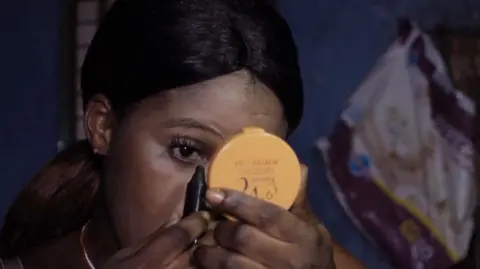
Nata is also a single mother in her twenties.
She has three daughters.
We met her at home, where she was getting ready to go out to work.
“I want my child to live well. I hope God will answer my prayers,” she said.
Her daughter watched her mother put on makeup. She told us she wanted to be a lawyer when she grew up.
“To help my mother,” she said.
Across town we met another girl named Rugiatu, about 10 years old.
Her mother, Gina, was also a prostitute. She was murdered in 2020 at the age of 19.
Rugiatu currently lives with his elderly grandmother.
“My parents are gone. I only have my grandmother left. If she dies, all I can do is beg on the streets,” Rugiatu said.
“I don’t want them to kill me in the street anymore.”
When we met Nata again, she was unrecognizable. She was also addicted to kush.
“I’m not happy living like this, but I don’t want to think about it anymore,” she told us.
“Sometimes I cry when I remember. That’s why I smoke, to forget.”
Her three daughters had to go live with relatives.
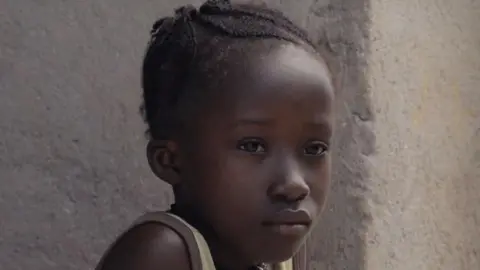
Then, in early 2024, there was more bad news from Isata.
She was trafficked again, part of a group of women promised nannies in Ghana but instead taken to Mali and forced into prostitution in a gold mining area.
“I want to be taken home. I’m begging, I regret everything,” Isata told us over the phone.
She said she became worried when the man who promised to be a nanny avoided police checkpoints and border guards at every stage of the trip.
“He handed us over to a Nigerian woman named Joy,” she said.
“We asked, ‘You said we were going to Ghana to be nannies, is this Ghana?’”
“Joy asked us, ‘Didn’t they tell us to come here to do prostitution?’ Then I replied, ‘No.’”
“She said, ‘Go get some money,’ and gave it to her.”
Like many other trafficked women, Isata was required to work in exchange for paying her traffickers large sums of money in exchange for her freedom.
They told her she had to pay $1,700 (£1,300).
She would have to have sex with hundreds of men to make that much money.
The traffickers told her she had three months to pay them.
The International Organization for Migration (IOM) – the UN agency that assists trafficked people – says thousands of Sierra Leoneans, including children, are trafficked each year.
They are kidnapped or tricked into traveling abroad with the promise of a better job.
Instead, they are sold to foreigners in countries across the continent and subjected to forced labor or sexual exploitation.
Many may never return home.
Fortunately for Isata, she eventually returned to Makeni and is living with her mother and two children.
You can watch the full BBC Africa documentary Sex Workers: Lives in the Shadows on BBC Africa’s YouTube channel or on iPlayer in the UK.
More from BBC Africa Eye:
 Getty Images/BBC
Getty Images/BBC


